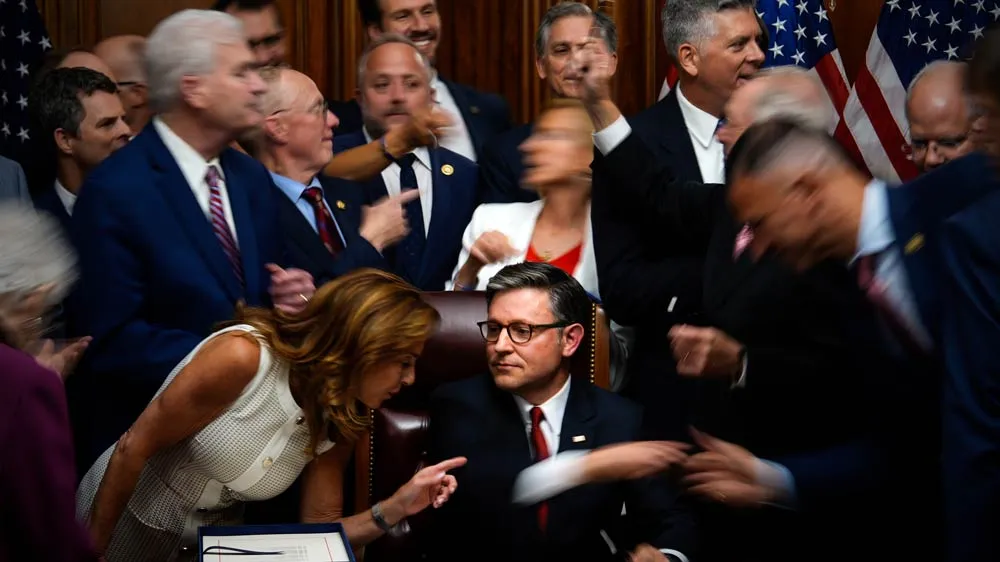March 13, 2014
Utah Defends Freezing Benefits for Gay Couples
Jason St. Amand READ TIME: 3 MIN.
Utah state attorneys told a federal judge Wednesday that it is reasonable to freeze benefits for more than 1,000 newly married gay and lesbian couples because their rights are not permanently vested until an appeal court rules on the state's same-sex marriage ban.
State attorneys also argued that the couples who married in December knew that the ruling from a federal judge that briefly made same-sex unions legal would likely be challenged.
Attorneys representing four gay and lesbian couples who brought the lawsuit against Utah in January called the state's contention that couples should have known the assumed risks in getting married "ridiculous."
Lawyers Erik Strindberg and Joshua Block told the judge that the court should force the state to move forward with benefits because the couples were legally married and have a right to accompanying benefits no matter what the appeals court rules on the state gay marriage ban.
U.S. District Court Judge Dale A. Kimball didn't issue a ruling, promising to take the nearly two hours of arguments under advisement and announce a decision soon.
His colleague, U.S. District Court Judge Robert J. Shelby, set off a rush on gay marriage when he overturned the state's same-sex marriage ban Dec. 20. He said the 2004-voter approved ban violates gay and lesbian couples' rights to due process and equal protection under the 14th Amendment.
For nearly three weeks in December, hundreds of same-sex couples married in county clerk offices as Utah state officials requested an emergency stay pending an appeals court ruling.
The weddings came to a halt Jan. 6 when the U.S. Supreme Court granted the emergency stay, something two lower courts denied.
Gov. Gary Herbert told state agencies to hold off on any new benefits for the couples until the courts resolve the issue. Agencies were told not to revoke anything already issued, such as a driver's license with a new name, but they are prohibited from approving any new marriages or related benefits. The state tax commission announced, however, that newly married gay and lesbian couples can jointly file tax returns for 2013.
On Wednesday, Kimball asked several pointed questions to state attorneys about their defense. He asked several times how his ruling would impact the pending case before the Denver-based 10th U.S. Circuit Court of Appeals and asked them to explain why the couples don't have vested rights.
"If they are married, they are married," Kimball said at one point.
Utah Assistant Attorney General Joni Jones argued that the validity of the marriages must be decided by a higher court, the reason the state opted to take a wait-and-see approach.
If the Court of Appeals, which has a hearing set for April 10 on the case, reverses the ruling and upholds the state's gay marriage ban, "the basis for these marriages will be undermined," Jones said.
Block, an attorney with the American Civil Liberties' LGBT project, hammered home his contention that same-sex couples married in Utah while it was legal have the right to every benefit afforded any married couple. No matter what the appeals court decides, or perhaps the U.S. Supreme Court later, these marriages are valid, he said.
"Whether Judge Shelby's decision was right or wrong, plaintiffs have vested rights than can't be taken away," Block said.
Jones, the state attorney, emphasized that the state isn't voiding the marriages, only putting a hold on benefits. She said state officials understand it's an emotional issue and that they are trying to respect the rights of the married couples.
Strindberg, a private attorney working with the ACLU, struck back at the state's contention that there is no harm being done by the couples waiting for higher courts to sort out the issue.
One young couple's adoption proceedings are on hold and another older couple lives in fear of not being able to be part of each other's important medical decisions, Strindberg said.
"It may be several years we're talking about where plaintiffs have to live in a state of uncertainty," Strindberg said. "Live in a state of being declared second-class citizens."


